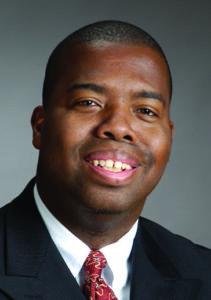I still remember sitting in the wooden chairs in Sunday school as faithful men and women taught me the word of God, from curriculum that came from the Baptist Sunday School Board, now known as Lifeway Christian Resources.
I would go on to work for Lifeway as a seminary student, to speaking at its summer camps, to being given the opportunity to write for other kids who would sit in chairs and be taught the curriculum I once was taught from. Lifeway was part of my start into the journalism calling I live out today. I would have considered myself at one time part of the Lifeway family — until this past week.
Lifeway’s mission statement is “to honor God and serve churches by designing trustworthy experiences that fuel ministry.”

Maina Mwaura
Yet after learning about Lifeway’s role in filing an amicus brief in a Kentucky Supreme Court case, seeking to limit the legal rights of sexual abuse survivors, it appears Lifeway’s mission statement couldn’t be further from the truth.
We now know Lifeway was the main player in creating this controversial amicus brief — an act that was done in secret and rushed ahead of a deadline.
Why this brief was filed is somewhat of mystery. Neither Lifeway nor the Southern Baptist Convention nor Southern Baptist Theological Seminary are involved in the case before the Kentucky Supreme Court. Their only connection is potentially seeking to stop other legal claims they face in Kentucky related to other sexual abuse cases.
We’ve now heard from the president of the SBC, the officers of the SBC Executive Committee and the president of Southern Seminary. We have not heard from Ben Mandrell, president of Lifeway.
He needs to take responsibility as the ministry’s leader, and he needs to explain himself.
“Perhaps the greater question is why not a single Lifeway trustee has spoken publicly on this matter.”
Perhaps the greater question is why not a single Lifeway trustee has spoken publicly on this matter. Mandrell is accountable to them. What are they saying to him?
Their job is not to rally around their leader but to lead Lifeway to fulfill its mission to honor God and serve churches.
Mandrell is a charismatic leader who appeared on the scene after being a high-profile church planter in Denver. He has enjoyed the benefits and perks of denominational leadership, yet he seems to think he’s not accountable for his own actions.
Far too often in Southern Baptist culture, leaders are given a pass and even a shield of protection. That’s certainly been true of Kevin Ezell, president of the SBC North American Mission Board.
We know from public records that in relation to Will McRaney’s lawsuit against Ezell and NAMB, former NAMB trustee Chairman Danny Woods said: “Kevin, … everyone is in your corner praying for you and ready to go to battle with you and for you. Our shields are locked.”
Woods and NAMB trustees should have been in the corner of Southern Baptists, not just protecting their president.
“When Southern Baptists vote to elect trustees, they expect those trustees to hold leaders accountable and always to speak for Southern Baptists who are not in the room.”
When Southern Baptists vote to elect trustees, they expect those trustees to hold leaders accountable and always to speak for Southern Baptists who are not in the room.
And they especially ought to stand up and speak for abuse survivors, not against them as this amicus brief does. Those who created and signed off on this brief failed to honor God. And they did so apparently without consulting their trustees.
Knowing this silent witness was filed in a Kentucky courtroom, these leaders went about their business and said nothing about what they had done. Instead, Southern Seminary President Al Mohler led the charge to have Saddleback Church kicked out of the convention for allowing women to preach. And Mandrell showed up at the SBC annual meeting to serve a free breakfast and encourage churches to buy more of Lifeway’s products.
Ironically, one of those Lifeway products is One Source, used to conduct background checks on church volunteers and staff to keep out sexual abuse violators.
Mandrell and Mohler and Barber and Willie McLarin — now exiled for other offenses — did not have the best interest of Southern Baptists or sexual abuse survivors in mind when they affirmed that legal brief.
I’m deeply grieved by the cowardly silence of Lifeway’s trustees, who should have called out Mandrell for this afront to multiple SBC resolutions and the clear will of the messengers at consecutive annual meetings.
I will be asking my church to discontinue purchasing any Lifeway material and participating in any of its summer camp events until Mandrell is held accountable for his deceit. I am asking other churches to do the same, in standing with sexual abuse survivors.
This is personal for me. I, too, am an abuse survivor, and I know the feeling many sexual abuse survivors are going through to relive their trauma again and again when their church lets them down again and again.
But we know God sees. And we know when children were in the presence of Jesus, he taught us to value them without worrying about status or financial gain.
In any other business in America, a CEO who signed a controversial legal brief without the knowledge of those to whom he is accountable would be fired. In any church in America, a pastor who signed a controversial legal brief without the knowledge of those to whom he is accountable would be fired.
It’s time we hear from the trustees of Lifeway and Southern Seminary and the SBC Executive Committee. Because God sees.
Maina Mwaura is a freelance writer and communications consultant who lives in the metro Atlanta area. A native of Orlando, Fla., he earned a bachelor of science degree in communications from Liberty University and a master of divinity degree from New Orleans Baptist Theological Seminary.
Related articles:
How to find the trustees of the SBC entities behind the amicus brief
SBC president apologizes for signing off on amicus brief
SBC abuse survivor advocate says controversial legal brief originated with Lifeway
The duplicity of an SBC amicus brief | Opinion by Christa Brown, David Clohessy and Dave Pittman


